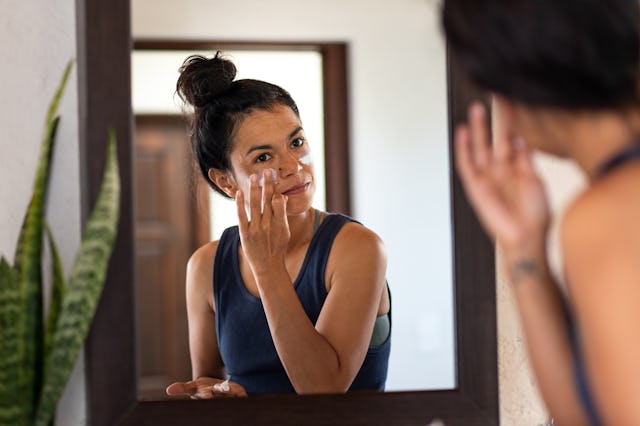What SPF Sunscreen Should I Use On My Face Every Day?
A dermatologist breaks down all of your FAQs about SPF.

Everyone knows we need to wear sunscreen. It reduces the risk of getting painful sunburns, skin cancer, and even aging. But do we really need to wear it every day? And if we are slathering it on every morning, what SPF do we need?
A quick visit to the sunscreen options aisle at your local pharmacy is all it takes to get confused about which one is best for you. What's mineral versus chemical? Should you be using different SPFs for your face and body? And what does SPF even mean in the first place?
To help sort out these sunscreen mysteries (and more), I asked an expert what you need to know about SPF and why — yep — you should put it on your face every day.
Is sunscreen necessary even on "indoor" days?
First things first, yes, sunscreen should be a daily habit.
"It is essential to wear sunscreen every day, regardless of how cloudy it is or how little time you'll be exposed to the sun — it's even valuable to wear it on days you spend entirely indoors," Dr. Geeta Yadav, board-certified dermatologist and founder of Facet Dermatology, tells Scary Mommy. "Wearing SPF daily dramatically reduces your risk of developing skin cancer, one of the most prevalent types of cancer in the U.S., as well as protects you against premature aging."
What is SPF?
SPF stands for "sun protection factor," which measures how much solar energy a particular product can protect your skin from.
"SPF, or sunscreen, is a product formulated to protect your skin from the damaging UV rays emitted by the sun," Yadav explains. "It is not an indication of how long a product can protect your skin from the sun."
What are the levels of SPF, and how do they differ?
When shopping for sunscreen, there are two terms you'll see a lot: chemical and mineral.
According to Yadav, chemical sunscreens work by "creating a chemical reaction in your skin within 15 minutes of application that converts the UV rays to which your skin is exposed into heat energy, which your skin then releases, rather than absorbing the damage." Mineral sunscreens, meanwhile, work by acting as a shield on the skin's surface, deflecting the rays. Though they work differently, "the end result is the same — protected skin," she says.
You'll also notice different numbers next to the term "SPF" on packaging. Yadav says the higher the sun protection factor is, the more defense it can provide from the sun. For example, SPF 50 provides more defense than SPF 15.
But while a higher SPF sunscreen does offer more protection, Yadav says it does only to a certain point. "SPF 30, which is the level of SPF all dermatologists recommend you wear daily, blocks about 97% of the sun's rays. SPF 15 blocks about 93%," she says, adding, "There is no sunscreen that blocks 100% of the sun's rays."
What level of SPF should you wear on your face every day?
SPF 30 is the magic number, says Yadav. However, she says those very sensitive to the sun may want to wear SPF 50 or higher, which will block 98% or so of the sun's rays.
"I'd also recommend those individuals wear UPF clothing, which has sun protection built into the fabric," she suggests. "But everyone should wear a minimum of SPF 30, no excuses."
Does skin tone matter when it comes to choosing an SPF?
"No, and unfortunately, this is a very common misconception," Yadav says. "Many people believe that if you have dark skin, you don't need to wear SPF because deeper skin acts as built-in sun protection. While it is true that deeper skin tones may not burn as easily, that doesn't mean it is impervious to sun damage. People of all skin tones are susceptible to skin cancer. The sad truth is that melanoma tends to be diagnosed later in those with dark skin tones — sometimes too late."
How much sunscreen should you apply?
When it comes to sunscreen application, more is better. According to Yadav, most people do not apply enough SPF in terms of quantity or frequency.
"You need to apply approximately an ounce of sunscreen to your body from the neck down (that's the size of a shot glass), which is a lot more than people realize," she says. "To your face and neck, you should apply a quarter of a teaspoon each."
Sunscreen also needs to be reapplied frequently — at least every two hours, more if you've been sweating or swimming. While creams and liquids tend to provide the best coverage, Yadav often recommends using powder sunscreens if you're not going to reapply a liquid, especially if you wear makeup.
And if you're prone to skipping or skimping on sunscreen, Yadav implores you to keep it a regular part of your skincare routine.
"It's crazy to me how so many people spend so much time and money correcting skin concerns that could have been avoided just by wearing sunscreen — and it's even crazier that so many people don't wear sunscreen even though it's an easy way to prevent skin cancer," she says. "We derms always remark upon the fact that skin seems to be the only organ that patients abuse in order to make it look 'better' — but if you treat it with care, it'll look and be healthy for decades to come."